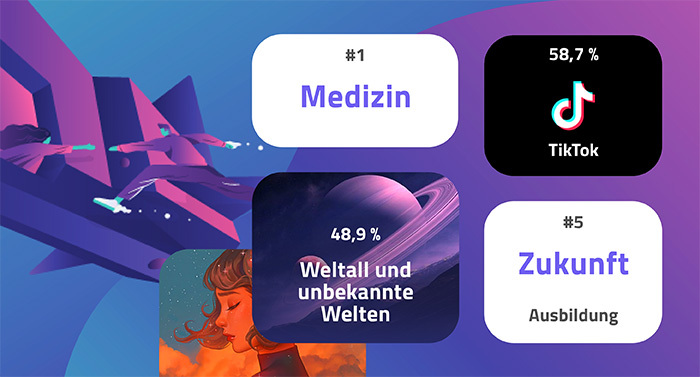Inspiring Generation Z for the skilled trades and finding new employees
Every company can successfully implement apprentice marketing and attract students.
Those who have not yet tried it or have thrown their hands up in despair will be
surprised at how diverse the possibilities have become in recent years and what
simple yet logical lessons we can take from this for the future.
In this article, we do not only discuss the trends but also share our experiences
and provide project insights that have given us new perspectives on the expectations of Gen Z.

The Top Reasons Why Apprentice Marketing is Relevant and How it Contributes to Business Success
Filling open apprenticeship positions in 2020 is hardly comparable to the supply-demand situation of about four years ago. Many industries openly discuss the lack of young talent and an increasing skills shortage. Numerous industries now operate in a demand-driven apprenticeship market, as for over 12 years, particularly skilled trades have seen declining interest from young talent. Generation Z thinks differently, and this is reflected in several aspects of development:
- Life in the city seems significantly more attractive than in the countryside. This urbanization trend, already observed with Gen Y, continues.
- Demographic change is a clear factor, completely reshaping the future supply-demand balance in many industries.
- The restructuring of some apprenticeships into dual or full-time degree programs reflects an increasing academic orientation.
- The image of many professions is outdated, and innovations often fail to reach younger audiences.
- Parents often influence their children’s career choices, hoping they will "achieve more." Friends and teachers also play a role in shaping their aspirations.
- Career opportunities, especially in skilled trades, are often overlooked due to the overwhelming variety of choices available after graduation.
The primary goal of marketing initiatives targeting young talent seems to be filling open apprenticeship positions. However, companies also gain several other key advantages:
- They can generate long-term awareness among young talent regarding career opportunities.
- Increasing the number of applicants creates a more diverse pool of interested candidates, allowing businesses to better understand youth values and expectations.
- Providing realistic insights into the training program significantly reduces the likelihood of apprentices dropping out.
- Achieving an optimal match between companies and apprentices.
- Ensuring long-term retention and career development for graduates.
- Improving the company’s long-term image.
Is It All About Image? Where and How to Reach Gen Z
Various organizations, such as the Central Association of German Crafts (The Economic Power. From Next Door.) and the Federal Employment Agency, have launched attractive image campaigns to enhance their appeal.
These initiatives and similar actions have become a crucial part of overall outreach efforts to support workforce recruitment. Sponsored events such as holiday workshops and job placement initiatives offer companies effective yet manageable ways to engage young talent.
These large-scale campaigns no longer rely solely on traditional media channels. Given that the target audience is predominantly digital, businesses must adjust their approach accordingly. Digital outreach has become an essential starting point for all marketing efforts.
Search engine queries are a vital part of how students navigate the complex world of career choices. Yet, many companies remain hard to find via Google searches. Search engine optimization (SEO) or search engine marketing, such as Google AdWords, can help, but small businesses often struggle with the ongoing investment required in both advertising budgets and website development.
Providing career guidance during school enables companies to establish early contact with potential apprentices. Combined with career fairs, businesses can engage with students in a direct, personal, and meaningful way. For young people, concrete insights into the job and workplace help them align their expectations with the company.
School partnerships and career orientation days like Girls' Day and Boys' Day are excellent opportunities to integrate students into business operations and showcase industry diversity.
What Type of Communication Do Apprentices and Employers Want?
We all talk about authenticity and personal communication at eye level, yet at least two generations with different values are interacting. It’s only natural that recruiters and HR managers often find themselves puzzled. Generation Z is highly perceptive—they can quickly spot inauthentic interactions, and artificial attempts to adapt to their communication style will fail.
Likewise, the choice of communication channels is evolving. What was considered a must-have in recruiting in 2018 is no longer as relevant today. Platforms such as WhatsApp, Snapchat, and TikTok, once touted as essential for engaging Gen Z, are proving less effective in professional recruiting.
Students draw a clear distinction between their "private and professional lives." They see no real value in engaging with employers on social platforms primarily designed for entertainment. A Perwiss.de article highlights this phenomenon.
Influencer marketing is another approach that has gained traction among businesses. While influencers have a strong reach among Gen Z, their involvement in apprentice recruitment has not always yielded positive feedback. The lack of authenticity and personal experience in these promotions often fails to connect with the target audience.
Personal Insights: The “Career Profiles” Project
At scoolio, we’ve also explored the preferences of Gen Z in our app, particularly regarding their expectations of online marketing. This led to the pilot project “Career Profiles.”
How can we make career paths more relatable? How do we generate “Aha!” moments for students unfamiliar with certain professions?
Platforms like Instagram and TikTok are no longer just for personal content; professional insights are increasingly popular. Career overviews in industries like skilled trades, healthcare, and agriculture are reaching young audiences through these platforms.
To engage students, we launched the #dasistmeinjob campaign in collaboration with passionate professionals. Our goal was to spark curiosity, break down stereotypes, and showcase the personal side of different careers.
The campaign featured real professionals with a deep passion for their work—people who view their jobs as a calling rather than just employment. The response was overwhelmingly positive, and we saw high engagement rates. This demonstrated that apprentice marketing is not just about job postings; it’s also about educating students on career opportunities and helping businesses find the right talent.
Going forward, scoolio will continue to integrate career exploration into its app, with a strong focus on making career discovery accessible, informative, and engaging for students.
Author: Team scoolio
Related Articles
Company Blog
Our company blog features news, trends, and insights in helpful articles. Interesting and informative posts give you insight into the perspectives of Generation Z, new opportunities in corporate communication, as well as success stories from our customers and our young, dedicated team.
Tags
- Mobile Recruiting
- Mobile Advertising
Your Experts in Apprenticeship Recruiting

Want to reach young people? We can help you with that.
Call Now
Send an Email

